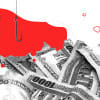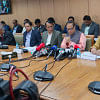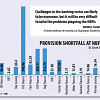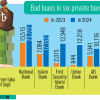Bad loans pile up at state banks, eating away profits

Four state-run commercial banks registered 29 per cent year-on-year spike in bad loans in 2022 as the central bank's relaxed classification rules introduced in the wake of the Covid-19 outbreak ended and their inefficient lending persisted.
This forced Sonali, Janata, Agrani and Rupali banks to set aside higher provisions. As a result, their collective profits declined more than 24 per cent to Tk 703 crore last year.
The bad loans at the four banks surged to Tk 42,161 crore last year from Tk 32,618 crore a year ago, according to their financial statements. The loan loss provision, an income statement expense set aside as an allowance for uncollected loans and loan payments, rocketed 35 per cent to Tk 3,543 crore.
"Defaulters are getting policy support in various ways, including the increase in the number of installments, the extension of the repayment period and the waiver of interest. So, many borrowers don't bother about repaying loans to the state-run banks," said AB Mirza Azizul Islam, a former finance adviser to a caretaker government.
On March 19 of 2020, less than two weeks after the government first reported the country's maiden coronavirus cases, the Bangladesh Bank asked lenders not to consider businesspeople as defaulters even if they fail to repay instalments until June 30 that year. The facility was extended several times and was in place even in 2022.
As part of the relaxed loan classification, the repayment period for defaulted loans was increased to eight years from two years. The down payment requirement for rescheduling was lowered to as little as 2.5 per cent. Non-performing loans can be rescheduled up to four times, said the World Bank last month.
The largest lender in Bangladesh, Sonali Bank's bad loans rose 2.58 per cent year-on-year to Tk 11,859 crore in 2022. The volume represented 14 per cent of its total loans.
Substandard loans increased 132 per cent to Tk 519 crore. However, the doubtful loans fell 2 per cent to Tk 165 crore. Provisions against the bad assets were 5.9 per cent higher at Tk 1,644 crore.
Based on the classification status, banks have to maintain 50 per cent in provision for doubtful loans and 100 per cent for bad loans.
On the back of higher net interest income and commission and charges income, Sonali's profits rose 7.36 per cent to Tk 408 crore.
A top official of a state-run bank said borrowers enjoyed the moratorium on loan classification in 2020 and 2021 and the facility continued in 2022, albeit in less relaxed form. So, the bad loans rose.
The situation was also dire at Agrani Bank whose profits slumped due to the higher bad loans and lower investment incomes and income from commissions and charges.
Agrani's profits fell 32 per cent to Tk 141 crore in 2022. Bad loans surged 60 per cent to Tk 14,325 crore.
Substandard loans increased 13 per cent to Tk 799 crore while doubtful loans dropped 25 per cent to Tk 273 crore.
Salehuddin Ahmed, a former governor of the central bank, said the lending rate of the state-run banks was lower compared to private banks, so their profits were lower compared to their portfolio.
"On the other hand, the volume of bad loans is increasing at a higher rate at the state banks as they lack professional management."
Janata Bank's profits tumbled 56 per cent to Tk 126 crore last year. Bad loans increased 27 per cent to Tk 15,119 crore.
Its substandard loans dropped 87 per cent to Tk 41 crore while doubtful loans fell 70 per cent to Tk 36 crore.
Rupali Bank's profits plummeted 44 per cent to Tk 28 crore. Bad loans rocketed 228 per cent to Tk 858 crore.
According to Mirza Azizul Islam, banks do not take timely action against defaulters.
"Even when they take action, borrowers file writ petitions and the issues linger for a longer period."
He also said the efficiency of many bankers of state-run banks is not up to the mark.
"And, they do not bother how banks perform as the officials who were allegedly involved in irregularities were not punished. The officials believe that the government will not allow the state-run banks to collapse and will unveil bailout packages, if necessary."
The former secretary called for restoring accountability in the state-run banks.
Islam emphasises taking effective actions against bad loans by filing cases and taking over collaterals. "The central bank, along with the finance ministry, should meet with the chief justice to find out a way in order to have loan-related cases resolved as early as possible."
Salehuddin Ahmed blamed the central bank's lack of complete control over the state banks for their deteriorating financial health since they are controlled by the finance ministry.
"The government needs to pay more attention to reducing bad loans in the banking sector."
The state-run banks provided many loans owing to political influence. At the same time, they also lent to various sectors at the direction of the government. Many of them have become bad loans, according to Anis A Khan, a former chairman of the Association of Bankers, Bangladesh.
He said since the moratorium on loan classification ended in 2022, the real scenario of bad loans is getting clearer. "If all of the bad loans were recognised properly, they would have incurred losses."
The former managing director of Mutual Trust Bank recommended setting up asset reconstruction companies, which are specialised financial institutions that buy bad assets from banks and financial institutions so that the latter can clean up their balance sheets.
"The merger can also be a part of the thinking of the government in order to strengthen capital and assets and increase acceptance among foreign banks to run trade finance business," he added.
A central banker said the moratorium on loan classification was extended to help borrowers ride out the impacts of Covid-19.
"Many facilities were in place in 2022. Still, the bad loans rose. This means the volume of bad loans of the state-run banks has gone up only because of the absence of the facility. In fact, these banks have problems when it comes to lending."
According to the World Bank, the extent of troubled assets is obscured by lax regulatory definitions and reporting standards, extended forbearance, as well as weak supervisory enforcement.
Published NPL statistics do not reflect internationally accepted definitions (90 days past due) of non-performing exposures, it said in April.

 For all latest news, follow The Daily Star's Google News channel.
For all latest news, follow The Daily Star's Google News channel. 








Comments